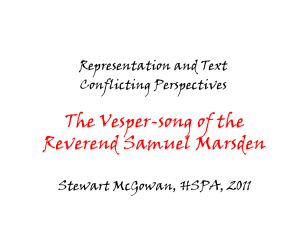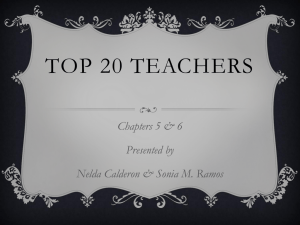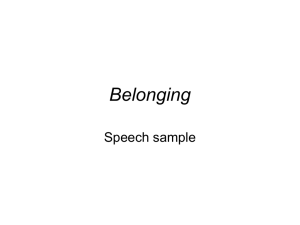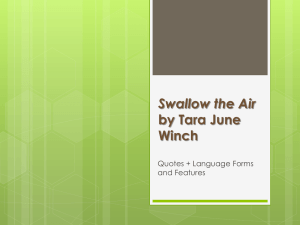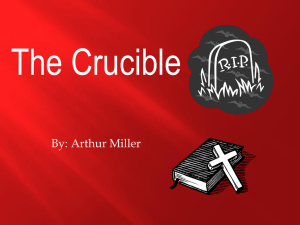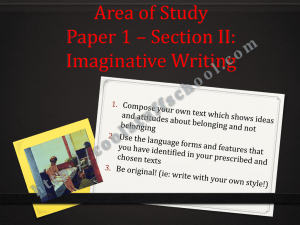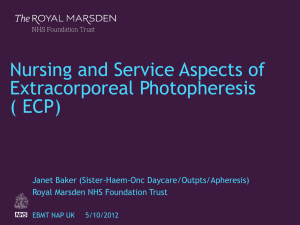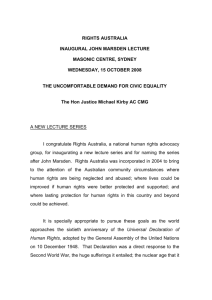Belonging Crucible Marsden lec 2013
advertisement
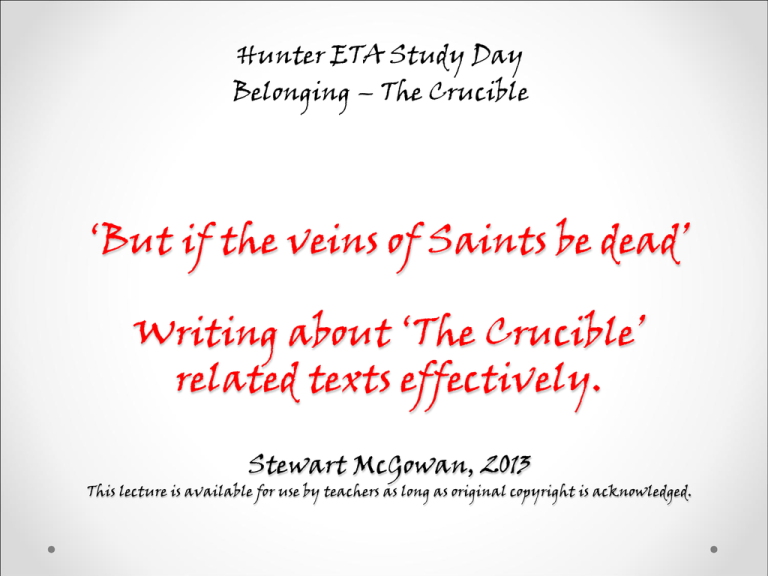
Hunter ETA Study Day Belonging – The Crucible ‘But if the veins of Saints be dead’ Writing about ‘The Crucible’ related texts effectively. Stewart McGowan, 2013 This lecture is available for use by teachers as long as original copyright is acknowledged. Lecture Overview • Look at ‘The Crucible and a related text • Explore the dynamic connections between them • Focus on what is revealed about the ways the texts make meaning • Relate both texts to a complex understanding of ‘Belonging’ – see next slide • Demonstrate how your writing about a text can develop, building on first ideas through to an academic response. The Problem… In The Crucible Hathorne and Danforth combine to stop others from belonging to the society of Salem. In Act 3, they bully Mary Warren, forcing her to tell the court that ‘I thought I saw spirits’ but when Abigail begins to ‘freeze’ and see the ‘shadow’ of the black bird Mary Warren is forced to choose whether she will belong to the society of Salem or to the girls and their hysterical ways. This is just like in The Lion King, where Simba must choose between life with Timon and Pumbaa or… The Problem… • Students need a more complex understanding of belonging. • You have to be able to choose between and talk about ‘big ideas’ • Looking at a pair of texts together can focus your thinking and drive towards the big ideas AREA OF STUDY: Belonging This Area of Study requires students to explore the ways in which the concept of belonging is represented in and through texts. Perceptions and ideas of belonging, or of not belonging, vary. These perceptions are shaped within personal, cultural, historical and social contexts. A sense of belonging can emerge from the connections made with people, places, groups, communities and the larger world. Within this Area of Study, students may consider aspects of belonging in terms of experiences and notions of identity, relationships, acceptance and understanding. Texts explore many aspects of belonging, including the potential of the individual to enrich or challenge a community or group. They may reflect the way attitudes to belonging are modified over time. Texts may also represent choices not to belong, or barriers which prevent belonging. Miller, Arthur, The Crucible: A Play in Four Acts, Penguin Modern Classics, 2000, ISBN: 9780141182551 Background: Marsden • http://www.adb.onl ine.anu.edu.au/bio gs/A020176b.htm • Wikipedia article includes a description of Marsden overseeing the flogging of convicts MARSDEN, SAMUEL (1765-1838), chaplain, missionary and farmer, was born on 24 June 1765 at Farsley, Yorkshire, England, the son of Thomas Marsden, a blacksmith… … The advent of the more religiously inclined Governor John Hunter in 1795 recognized the chaplain's efforts to reclaim the convicts' souls or at least to achieve an outward observance of moral and religious injunctions; but this effect was counterbalanced by Marsden's appointment as a magistrate and superintendent of government affairs at Parramatta. Clerical justices were common in England at the time but his magisterial posts kept him occupied with heavy temporal duties, and they also further estranged him as a clergyman from the convicts to whom he dispensed justice. No aspects of Marsden's activities did more harm to his pastoral work or to his historical character in Australia than his reputation for extreme severity as a magistrate. This was firmly set by September 1800 when, in the course of an inquiry into a suspected Irish uprising, Judge Advocate Richard Atkins and Marsden had a suspect flogged mercilessly in the hope of securing information about hidden weapons. This particular action was scarcely defensible, but Marsden was not the only magistrate who ordered the infliction of illegal punishments. His general severity can be attributed to his high-mindedness, his passionate detestation of sin and his conviction that Parramatta was such a sink of iniquity that morality could be preserved only by the most rigorous disciplinary measures. For all that, the flogging parson, like the hanging judge, is commonly regarded as an unattractive character. Background: Marsden . The very first blows made the blood spout out from Fitzgerald's shoulders; and I felt so disgusted and horrified, that I turned my face away from the cruel sight. ... I have witnessed many horrible scenes; but this was the most appalling sight I had ever seen. The day was windy, and I protest. that although I was at least fifteen yards to leeward, from the sufferers, the blood, skin, and flesh blew in my face as the executioners shook it off from their cats. Fitzgerald received his whole three hundred lashes. The Vesper-song of the Reverend Samuel Marsden Kenneth Slessor First Responses VESPER-SONG OF THE REVEREND SAMUEL MARSDEN My cure of souls, my cage of brutes, Go lick and learn at these my boots! When tainted highways tear a hole, I bid my cobbler welt the sole. 0, ye that wear the boots of Hell, Shall I not welt a soul as well? 0, souls that leak with holes of sin, Shall I not let God's leather in, or hit with sacramental knout Your twice-convicted vileness out? Lord, I have sung with ceaseless lips A tinker's litany of whips, Have graved another Testament On backs bowed down and bodies bent. My stripes of jewelled blood repeat A scarlet Grace for holy meat. Not mine, the Hand that writes the weal On this, my vellum of puffed veal, Not mine, the glory that endures, But Yours, dear God, entirely Yours. Are there not Saints in holier skies Who have been scourged to Paradise? 0, Lord, when I have come to that, Grant there may be a Heavenly Cat With twice as many tails as hereAnd make me, God, Your Overseer. But if the veins of Saints be dead, Grant me a whip in Hell instead, Where blood is not so hard to fetch. But I, Lord, am Your humble wretch. - Kenneth Slessor Connections - Content • Restrictive society the subject of both works • Composers of both works reflect on previous historical times in an attempt to make sense of their own context– 1930’s Australia and 1950’s USA • Torture and excessive punishment –the inflexibility of Danforth and Marsden Connections - Irony • The Crucible: the Puritans who had fled England to establish a society free from religious persecution end up as their own tormentors • Vesper-Song: the tormentor of the convicts is the man who is responsible for their spiritual well-being Connections -Themes • Intolerance. In both works, moral laws and state laws are intertwined. Both composers describe a society that is rigid and inflexible. • Both composers are arguing that societies without flexibility and understanding create barriers to a sense of individual belonging • John Proctor’s final choice is a way that Miller affirms this view of belonging. Connections -Themes • Reputation – Danforth and Marsden both believe themselves to be doing God’s work • Hysteria – • Empowerment – • Individual identity – Looking Deeper - Character • Slessor: The bullying preacher is the persona – a character ‘type’. • Miller: Characterisation is central to the way the play creates meaning. The Crucible – Character Interactions Source: Krystal Bevin Looking Deeper - Language • Slessor: pious language vs the language of punishment • Miller: dramatic technique – use of cacophony. • Both: deliberately archaic language VESPER-SONG OF THE REVEREND SAMUEL MARSDEN My cure of souls, my cage of brutes, Go lick and learn at these my boots! When tainted highways tear a hole, I bid my cobbler welt the sole. 0, ye that wear the boots of Hell, Shall I not welt a soul as well? 0, souls that leak with holes of sin, Shall I not let God's leather in, or hit with sacramental knout Your twice-convicted vileness out? Lord, I have sung with ceaseless lips A tinker's litany of whips, Have graved another Testament On backs bowed down and bodies bent. My stripes of jewelled blood repeat A scarlet Grace for holy meat. Not mine, the Hand that writes the weal On this, my vellum of puffed veal, Not mine, the glory that endures, But Yours, dear God, entirely Yours. Are there not Saints in holier skies Who have been scourged to Paradise? 0, Lord, when I have come to that, Grant there may be a Heavenly Cat With twice as many tails as hereAnd make me, God, Your Overseer. But if the veins of Saints be dead, Grant me a whip in Hell instead, Where blood is not so hard to fetch. But I, Lord, am Your humble wretch. VESPER-SONG OF THE REVEREND SAMUEL MARSDEN My cure of souls, my cage of brutes, Go lick and learn at these my boots! When tainted highways tear a hole, I bid my cobbler welt the sole. 0, ye that wear the boots of Hell, Shall I not welt a soul as well? 0, souls that leak with holes of sin, Shall I not let God's leather in, or hit with sacramental knout Your twice-convicted vileness out? Lord, I have sung with ceaseless lips A tinker's litany of whips, Have graved another Testament On backs bowed down and bodies bent. My stripes of jewelled blood repeat A scarlet Grace for holy meat. Not mine, the Hand that writes the weal On this, my vellum of puffed veal, Not mine, the glory that endures, But Yours, dear God, entirely Yours. Are there not Saints in holier skies Who have been scourged to Paradise? 0, Lord, when I have come to that, Grant there may be a Heavenly Cat With twice as many tails as hereAnd make me, God, Your Overseer. But if the veins of Saints be dead, Grant me a whip in Hell instead, Where blood is not so hard to fetch. But I, Lord, am Your humble wretch. Language –vocabulary Cure – pun: curates in the church have charge over a cure sole: another pun human soul/ sole of a shoe God’s leather i.e. A whip Sacrament: a holy service knout: another sort of whip twice-convicted: i.e. A convict who has again broken the law tinker’s litany: tinkers wares would clatter and rattle as they approached: a litany is a religious chant or song graved: another pun: engraved/ sent to his grave testament: Old and New... But note what the Bible says about anyone who writes ‘another testament’ Language –vocabulary stripes of jewelled blood: the marks of the whip – but note the metaphor! Like jewels! (Milton + false paradise?) Grace: ‘state of Grace’ a state of spiritual contentment weal: wound left by a whip vellum: soft, thin leather, originally used for books (note the extended metaphor glory is ironic: Gloria in excelsis deo Glory to God! Marsden hypocritically claims that he does all this for god scourged: cleansed of sin by whipping. Suggests sadomasochism cat: cat-o’ nine tails – a whip (but the multiple tails...) overseer: responsible for supervising (and punishing) convicts ‘grant me a whip in Hell instead’: if you don’t need someone to swing a whip in heaven.... Looking Deeper - Language • The Crucible – Act 1 to Act 2. Looking Deeper - Dialogue • Slessor – a dramatic monologue • Miller – dynamic use of dialogue. Includes non-reciprocal dialogue (Act 2) Looking Deeper - Language HALE: Pray you, someone take these. PARRIS (delighted): Mr Hale! Oh! It’s good to see you again. (Taking some books) My, they’re heavy! HALE (setting down his books): They must be; they are weighted with authority. A critical theme in The Crucible is the role that hysteria can play in tearing apart a community. Miller contrasts cacophony and silence throughout the play to heighten the impact that outbreaks of hysteria have on the audience. At the end of Act 3, for example, Hale loudly declares that he ‘denounces these proceedings’ while Danforth calls out his name ‘in a fury’. Ironically it is the men of religion who are responsible for this crescendo – which is followed by the darkness and silence of the opening of Act 4. Danforth’s rigid and inflexible views are critiqued by his contribution to the cacophony. Miller is making the point that those who set a higher importance on compliance to a set of norms than individual identity create barriers to belonging that we as individuals may not be able to overcome. Slessor similarly explores barriers to belonging. He uses the medium of poetry to launch a vicious satirical critique of Samuel Marsden and the values and attitudes he represents. He has his persona speak of how his ‘...stripes of jewelled blood repeat/ A scarlet Grace for holy meat.’ It is a startling image that combines the religious idea of ‘Grace’ and the comparison of pieces of ‘meat’ flying from the backs of whipped convicts as ‘jewels.’ Slessor challenges the historical view of Marsden as a tough man for tough times, showing us instead a hypocritical sadist, one whose twisted notion of identity over-rides his need to belong. Good luck!
